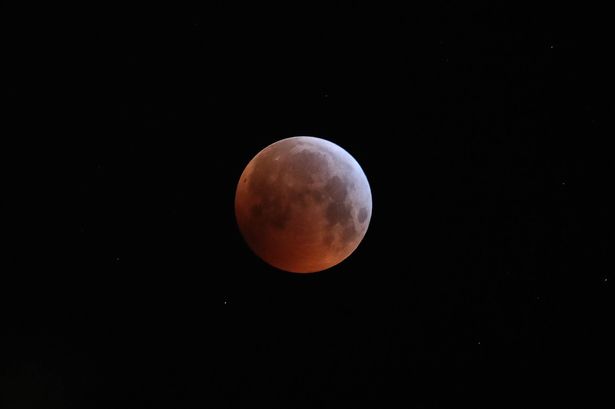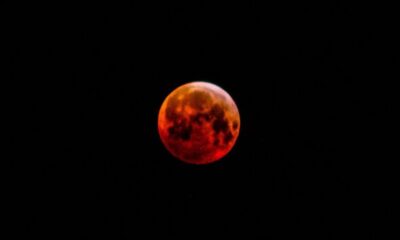World
Total Lunar Eclipse Set to Dazzle UK Skies on Sunday Night

A total lunar eclipse, commonly known as a “blood moon,” is expected to captivate observers across much of England and Wales on the evening of March 14, 2024. This astronomical event will mark the first total lunar eclipse since 2022, as the Earth aligns directly between the Sun and the Moon, casting a shadow that transforms the lunar surface into a deep, dark red.
Viewing Conditions and Timing
According to the Met Office, the eclipse will likely begin to be visible around 19:30 GMT, with the peak occurring at 19:33 GMT. For optimal viewing, the organization suggests finding a location with an unobstructed view of the eastern horizon. Clear skies are anticipated for most of England and Wales, enhancing the chance for a spectacular experience.
However, northern England and parts of Scotland may face cloudier conditions and heavy rain, which could hinder visibility. Observers in urban areas may need to seek elevated locations, such as hills or viewpoints, to ensure a clear sight of the celestial event.
Expert Insights on the Eclipse
Dr. Ed Bloomer, an astronomer at the Royal Observatory Greenwich, noted that the Moon will rise just in time for viewers to catch the end of the eclipse. He emphasized the significance of positioning: “The Moon is pretty unmistakable in the sky, so the most important thing is to face the right direction,” he stated. The Moon will rise in the east and move southward throughout the night.
Dr. Bloomer also pointed out that a low horizon is crucial for visibility. “A flat landscape or an elevated position makes for the best visibility,” he advised, suggesting that viewers avoid obstacles like buildings and trees. He added that this lunar eclipse offers an excellent opportunity for families to engage with astronomy, as it provides observable changes every minute.
Unlike solar eclipses, a lunar eclipse can be viewed directly with the naked eye since the Moon’s reflected light is not overly bright. This makes the event accessible for observers of all ages.
The next partial lunar eclipse will not take place until August 2026, making this weekend’s event a rare and exciting opportunity for sky watchers. As anticipation builds, enthusiasts are encouraged to prepare for a night of wonder under the stars.
-

 Entertainment1 month ago
Entertainment1 month agoKim Cattrall Posts Cryptic Message After HBO’s Sequel Cancellation
-

 Entertainment1 month ago
Entertainment1 month agoKate Garraway Sells £2 Million Home Amid Financial Struggles
-

 Entertainment2 weeks ago
Entertainment2 weeks agoMasterChef Faces Turmoil as Tom Kerridge Withdraws from Hosting Role
-

 Entertainment1 month ago
Entertainment1 month agoAldi Launches Cozy Autumn Fragrance Range Ahead of Halloween
-

 Entertainment2 months ago
Entertainment2 months agoSpeculation Surrounds Home and Away as Cast Departures Mount
-

 Entertainment1 month ago
Entertainment1 month agoMarkiplier Addresses AI Controversy During Livestream Response
-

 Health1 month ago
Health1 month agoWigan and Leigh Hospice Launches Major Charity Superstore
-

 Lifestyle3 weeks ago
Lifestyle3 weeks agoSummer Flags Spark Controversy Across England as Patriotism Divides
-

 Science1 month ago
Science1 month agoAstronomers Unveil New Long-Period Radio Transient ASKAP J1448−6856
-

 Entertainment1 month ago
Entertainment1 month agoLas Culturistas Awards Shine with Iconic Moments and Star Power
-

 Entertainment1 week ago
Entertainment1 week agoKatie Price Celebrates Surprise Number One Hit with Family Support
-

 Entertainment3 weeks ago
Entertainment3 weeks agoTurmoil in Emmerdale: Charity Dingle and Mack’s Relationship at Risk





















